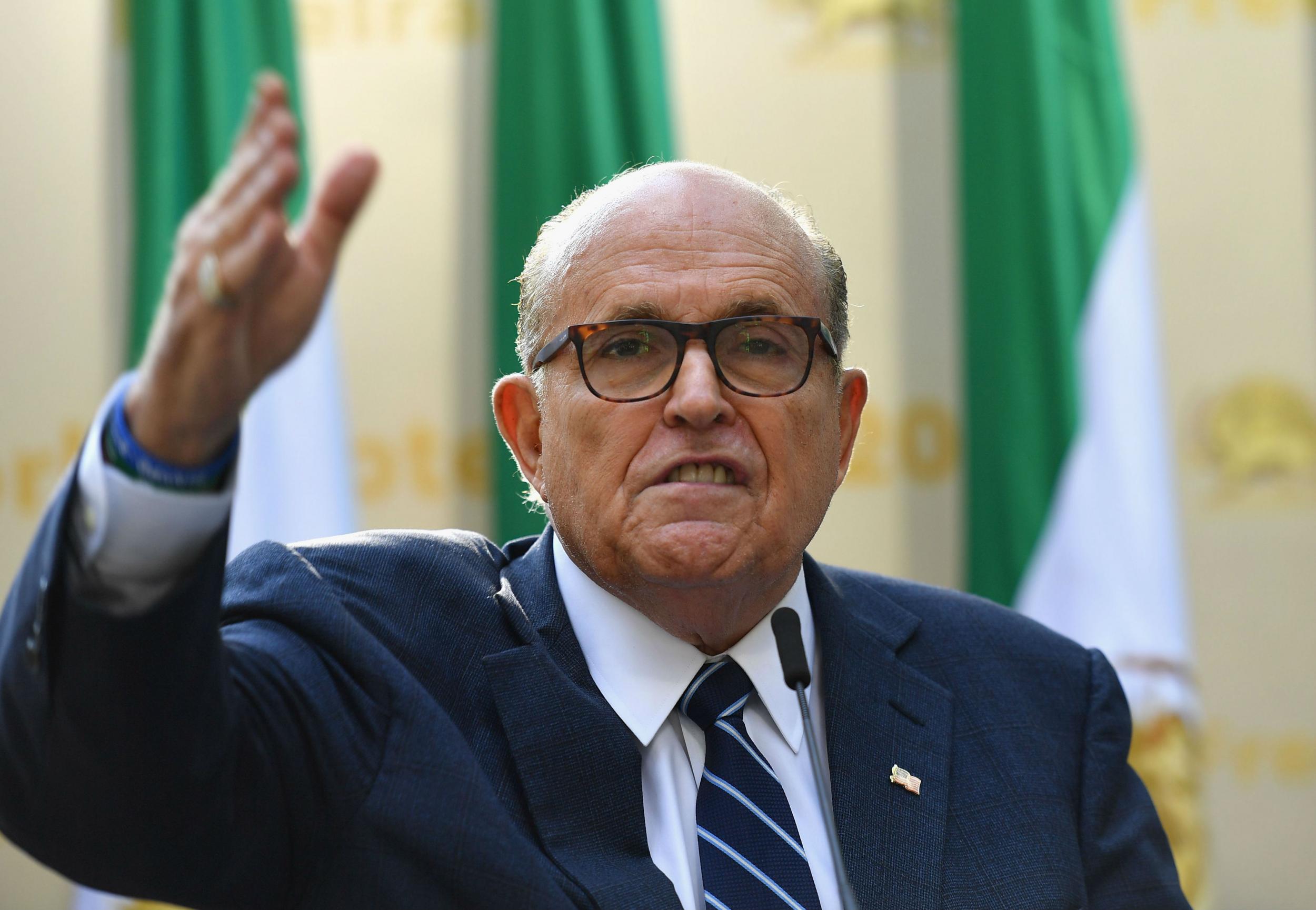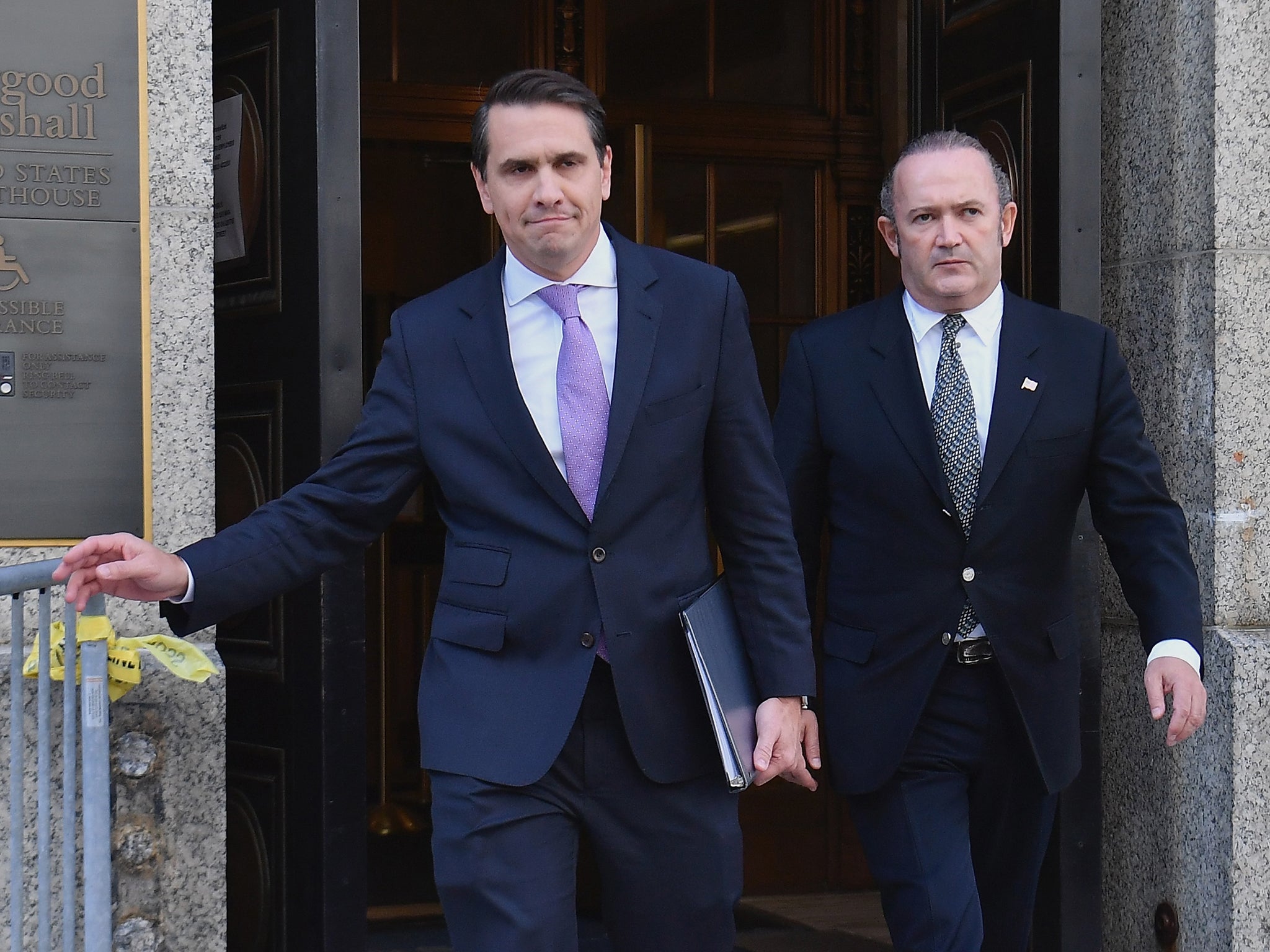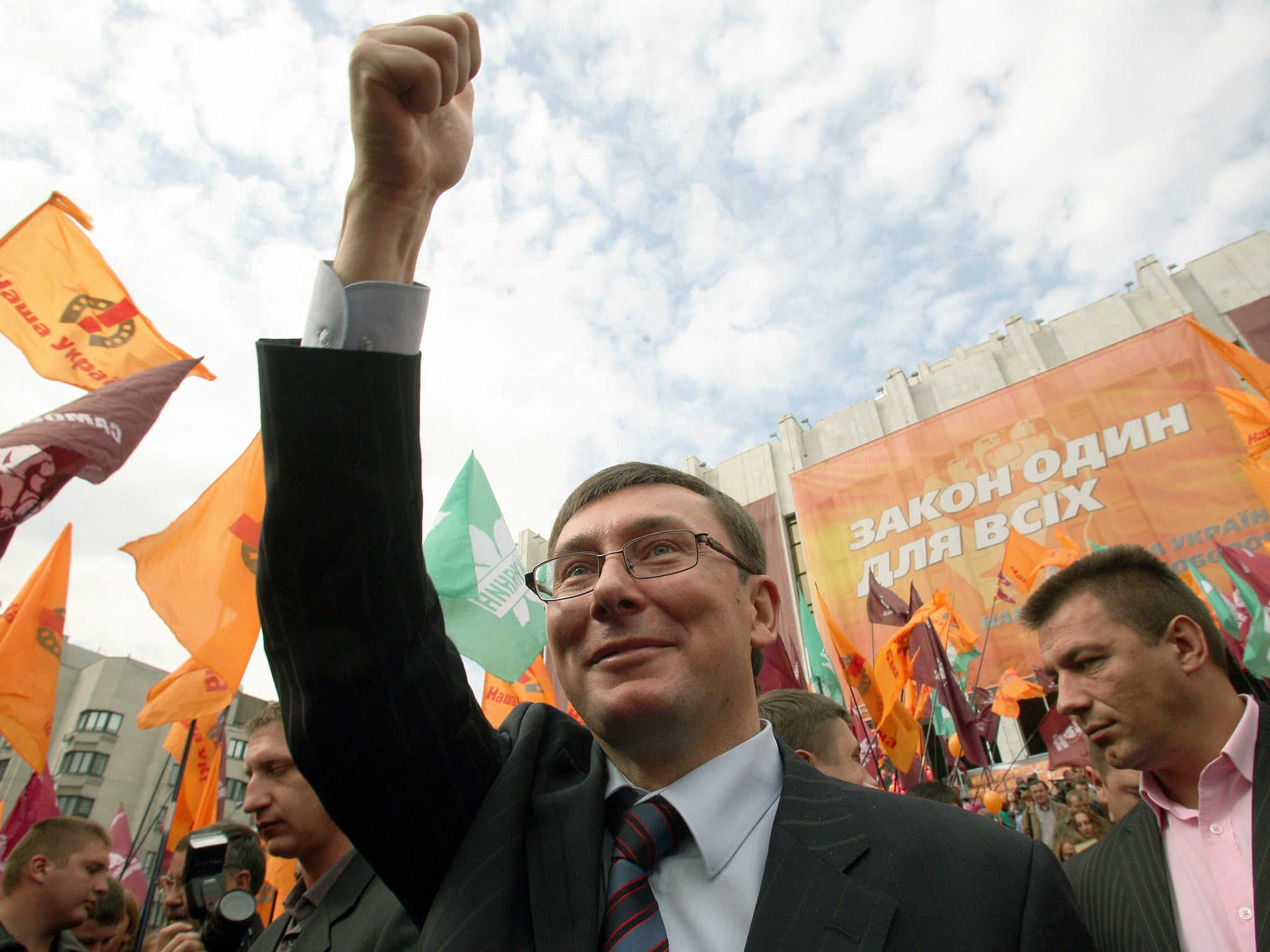Trump lawyer privately pursued business in Ukraine while trying find dirt on president's rivals, leaked documents show
Giuliani ‘was acting in behalf of US president’ to provide legal services

As Rudy Giuliani waged a public campaign this year to unearth damaging information in Ukraine about President Donald Trump’s political rivals, he privately pursued hundreds of thousands of dollars in business from Ukrainian government officials, documents reviewed by The New York Times show.
Mr Giuliani, the president’s personal lawyer, has repeatedly said he has no business in Ukraine, and none of the deals were finalised. But the documents indicate that while he was pushing Mr Trump’s agenda with Ukrainian officials eager for support from the United States, Mr Giuliani also explored financial agreements with members of the same government.
His discussions with Ukrainian officials, including the country’s top prosecutor, who assisted him on the dirt-digging mission, proceeded far enough along that he signed at least one retainer agreement, on his company letterhead.
In an interview Wednesday, Giuliani played down the discussions. He said that a Ukrainian official approached him this year, seeking to hire him personally. The lawyer said he dismissed that suggestion but spent about a month considering a separate deal with the Ukrainian government. He then rejected that idea.
“I thought that would be too complicated,” Mr Giuliani said. “I never received a penny.”
Mr Giuliani’s shadow diplomacy campaign in Ukraine on behalf of the president is a central focus of the current house impeachment inquiry.
At the same time, a federal criminal investigation into Mr Giuliani is examining his role in the campaign to oust Marie Yovanovitch, the US ambassador to Ukraine, and scrutinising any financial dealings he may have had with Ukrainian officials, according to people briefed on the matter.
Prosecutors and FBI agents in New York City are scrutinising whether Mr Giuliani was not just working for the president but also doing the bidding of Ukrainian officials who wanted the ambassador removed for their own reasons, the people said.
It is a federal crime to try to influence the US government at the request or direction of a foreign government, politician or party without registering as a foreign agent. Mr Giuliani did not register as one, he has said, because he was acting on behalf of his client, Mr Trump, not Ukrainians.
The lawyer has not been accused of wrongdoing.
The federal inquiry focused on Mr Giuliani grew out of the case against two of his associates, Lev Parnas and Igor Fruman, who were arrested on campaign finance charges last month. Alongside Mr Giuliani, Mr Parnas and Mr Fruman worked to pressure Ukraine into announcing investigations into former vice president Joe Biden and his son Hunter.
Mr Parnas and Mr Fruman have pleaded not guilty to the campaign finance charges.
Spokesmen for the US attorney in the Southern District of New York, Geoffrey S Berman, whose prosecutors are handling the case, and the FBI declined to comment.
The documents reviewed by The Times portray an evolving effort over the course of several months by Mr Giuliani and lawyers close to him to consider taking on various Ukrainian officials or their agencies as clients.
The Times could not determine whether the documents it reviewed comprised the entirety of discussions between Mr Giuliani and other lawyers about representing Ukrainian government officials.
The documents date to mid-February, when one draft proposal said Mr Giuliani would represent Yuriy Lutsenko, who was then Ukraine’s top prosecutor. At the time, Mr Giuliani had been working with Mr Lutsenko to encourage investigations into the Bidens and the 2016 election.
The draft proposal, which was unsigned and not on letterhead, called for Mr Lutsenko to pay $200,000 (£155,000) to retain Giuliani Partners, Mr Giuliani’s firm, and a husband-and-wife legal team aligned with Mr Trump, Joseph E diGenova and Victoria Toensing.

In return, Mr Giuliani would help the government recover money it believed had been stolen and stashed overseas, advising Mr Lutsenko “on Ukrainian claims for the recovery of sums of money in various financial institutions outside Ukraine”.
The proposal came a few weeks after Mr Giuliani met at his office in New York with Mr Lutsenko to discuss Ukrainian corruption. Mr Lutsenko told Mr Giuliani and others about payments he claimed involved Joe Biden, Hunter Biden and Burisma Holdings, a Ukrainian company that had named the younger Biden to its board, according to a memo summarising the talks. Mr Lutsenko also shared information he said he had about Ms Yovanovitch.
Mr Giuliani was critical of Ms Yovanovitch, whom he and other Republicans have said was opposed to the president. Mr Giuliani’s moves against her, however, were also aligned with the interests of Mr Lutsenko, who had butted heads with the ambassador.
Ultimately, Ms Yovanovitch was removed from her post in May, and Mr Lutsenko was replaced in August after a new Ukrainian president took office.
In the interview, Mr Giuliani said that after their meeting, Mr Lutsenko broached the idea of hiring him to help deliver information about corruption in Ukraine to US authorities.

Although Mr Giuliani worked for free for Mr Trump, he said he concluded that it would be a potential conflict of interest for him to represent the Ukrainian prosecutor in that capacity.
Still, he said, Mr Lutsenko also wanted to hire Mr Giuliani to help recover Ukrainian assets.
An updated proposal was circulated a few days later, along with instructions on how to wire money to Giuliani Partners. This version made no mention of Mr Lutsenko but instead sought $300,000 (£231,000) from the Ukrainian Ministry of Justice and the Republic of Ukraine.
The proposal was signed by Mr Giuliani, but not by the justice minister at the time, Pavlo Petrenko.
Asked why he signed that agreement and pursued payment, Mr Giuliani said he considered the deal in order to learn more about the recovery of assets and money laundering in Ukraine.
“It did not come out of my desire to make a lot of money,” he said, adding that his typical retainer is much higher than a few hundred thousand dollars.
“Originally, I thought I would do it. And then when I thought it over,” he said, “I thought it would look bad.”
The Ukrainian Ministry of Justice said Wednesday that it did not enter into any contracts or make payments to Mr Giuliani.
The proposed April agreement between Mr Lutsenko and Ms Toensing and Mr diGenova also referenced another assignment: helping him meet with US officials about “the evidence of illegal conduct in Ukraine regarding the United States, for example, interference in the 2016 U.S. elections.”
When asked for comment by The Times, a spokeswoman for Mr Lutsenko, Larisa Sarhan, referred to an interview Mr Lutsenko gave to a Ukrainian news outlet confirming that aides to Mr Giuliani had asked him to hire a lobbying company. He did not specify which company.
Mr Lutsenko told Ukrainska Pravda he had been seeking a meeting with William Barr, the US attorney general, and was in touch with unnamed advisers to Mr Giuliani.
“In the end, they said the meeting would be impossible unless I hired a company that would lobby for such a meeting,” Mr Lutsenko told the news outlet, adding that he declined to do that.
The proposals noted that Ms Toensing and Mr diGenova might have to register as foreign agents under US law.
“We have always stated that we agreed to represent Ukrainian whistleblowers,” Mark Corallo, a representative for the law firm of Ms Toensing and Mr diGenova, said in a statement Wednesday. Mr Corallo said the business proposals were “unaccepted” and the lawyers never represented the Ukrainians. “No money was ever received, and no legal work was ever performed,” he said.
In another agreement signed by Ms Toensing in April, the client would have been Victor Shokin, the top Ukrainian prosecutor before Mr Lutsenko. Mr Shokin was ousted after critics, among them Joe Biden, said he was soft on corruption.
Shokin did not respond to a request for comment.
The New York Times
Join our commenting forum
Join thought-provoking conversations, follow other Independent readers and see their replies
Comments